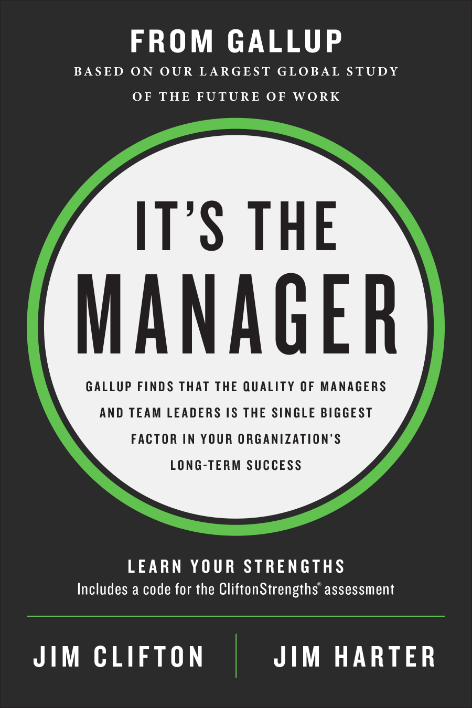Story Highlights
- Companies must embrace a culture of change
- Communicate often about the organization's future to reduce employee fear
- Employees need to feel like their development needs are addressed
For a company to manage disruptive change with minimal trauma, its employees must be willing and eager to make the transitional shifts it requires, despite the challenges. If employees are accustomed to a culture of change, they are less likely to feel threatened or overwhelmed when new initiatives require them to adapt.
Managers have the most important role in maintaining that agile cultural mindset.
There are two things managers can focus on to make change easier for their team members:
1. Clearly and frequently communicate the organization's core values and mission.
In doing this, leaders and managers provide employees with a foundation they can rely on to remain constant, even as the strategies and tools used to address core cultural elements are constantly evolving.
Gallup's recent study of four European countries suggests leaders and managers need to do better at assuring employees that short-term changes are aligned with a broader, long-term vision for the organization's future. Among employees in France, Germany, Spain and the U.K., just one-third (33%) strongly agree that the leadership of their company has a clear direction for the organization, and 21% strongly agree that their company's leadership makes them enthusiastic about the future.
Frequent communication about the organization's future often helps alleviate employees' anxiety about their place in it. Those who agree the leadership of their company has a clear direction for the organization are less likely than those who disagree to worry about new technology eliminating their jobs in the next five years -- 14% vs. 22%, respectively. Employees are also more motivated to address their own skill gaps when they understand and identify with their organization's mission. Workers are more likely to say they need skills training to do their jobs better when they agree that their company's mission and purpose makes them feel their job is important and that what they do at work is valuable and useful.
If employees are accustomed to a culture of change, they are less likely to feel threatened or overwhelmed when new initiatives require them to adapt.
Enthusiasm about the future is particularly important amid technological disruption because it signifies that employees have something to look forward to -- they see a way through chaos, complexity and change.
When enthusiasm is absent, employees are more likely to lose confidence and often feel helpless. Leaders and managers should always be thinking about how best to communicate how emerging technologies will open new possibilities for the future.
Changes in how companies are organized have made aligning employees with a common vision for the future even more important -- but also more challenging. Matrixed employees now collaborate across organizational and geographic boundaries, often working with several teams simultaneously. When disruptive change occurs, managers must work closely with company leaders and each other to establish a common understanding of how changes relate to the company's overall purpose and its ability to fulfill that purpose by meeting customers' needs.
It's not an easy job; it requires managers to have honest conversations about the challenges of disruptive change -- not just with their own team members, but with company leaders, to ensure their expectations are realistic and can be implemented in a way that avoids leaving employees feeling confused, anxious or undervalued. For many companies, this may mean actively involving managers in high-level discussions about implementation strategies. In Gallup's four-country study, just 25% of those in supervisory positions strongly agree that they often discuss new technology, trends and ideas that may be relevant to their work -- a proportion that's on par with nonmanagers (26%).
2. Maintain a culture of high development.
80% of those who agree their company is committed to building the strengths of each employee feel supported in developing new skills
Employees are less likely to view change as threatening if they already work in a culture of high development. In such environments, employees are accustomed to having regular conversations with managers about their professional development, so the need to learn about a new technology is simply another element in an ongoing discussion about training opportunities. Many European companies may need to place more emphasis on employee development; less than a third of employees in Germany, Spain and France strongly agree their company supports them in developing the skills they need for the future, while the U.K. fares only slightly better with 37% strongly agreeing.
If managers are already serving as career coaches to their employees, they don't have to start from scratch to meet their team members' needs for upskilling or reskilling during major changes. The manager's role is not easy; they must align company leaders' expectations for technology integration with employees' individual strengths and the shifting demands of customers.
Managers' coaching makes a powerful difference. More than three-fourths (78%) of employees who agree their manager gives them continuous feedback to improve their performance also say their company supports them in developing necessary skills.
Among employees whose managers do not provide continuous feedback, that figure falls to 33%. Similarly, 80% of those who agree their company is committed to building the strengths of each employee feel supported in developing new skills, versus 19% of those who disagree.
Helping employees focus on their development and future in the organization also helps managers generate enthusiasm and engagement among their team members. A targeted investment in an employee's abilities and skills tells them, "You are part of our future." Currently, however, just 36% of employees in the U.K., 33% in France, 27% in Germany and 22% in Spain strongly agree that there is someone at work who encourages their development.
The most crucial thing for managers to ensure in disruptive times is that employees feel they are part of the changes and their views on how to incorporate those changes are valued. Active involvement can help keep engagement levels high and harness employees' support in implementing the changes. Nothing is more important to employees' sense of stability and belonging than the feeling that their opinions are being listened to and taken seriously.
The future of work is here, don't get left behind.
- This article was featured in The Real Future of Work: Disruption issue -- download the magazine to continue reading.
- Watch The Real Future of Work: Disruption webinar to understand the current state of work and anticipate future challenges.
- Gallup's perspective paper Re-Engineering Performance Management gives insight into why traditional performance management systems are being disrupted.



